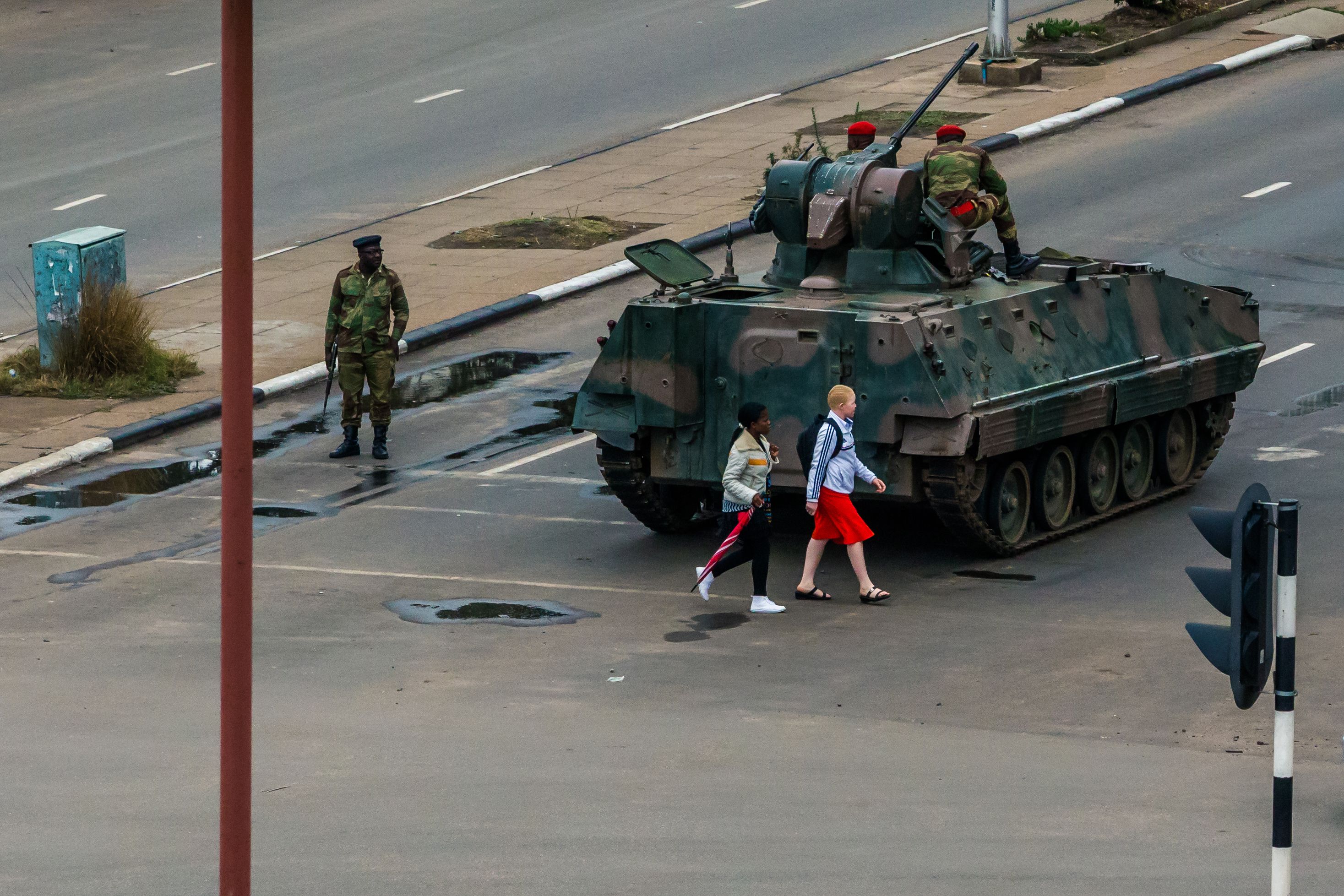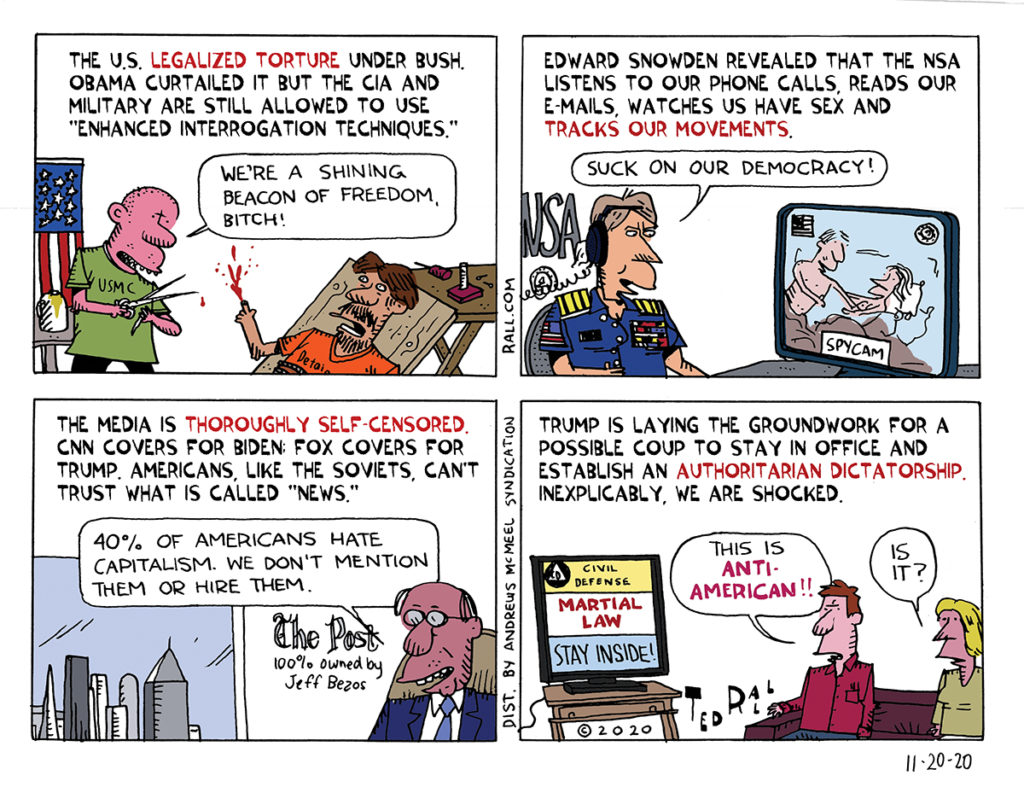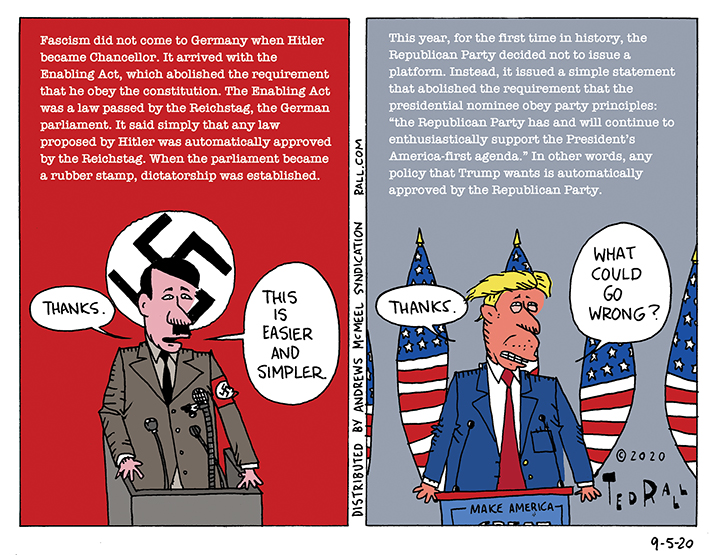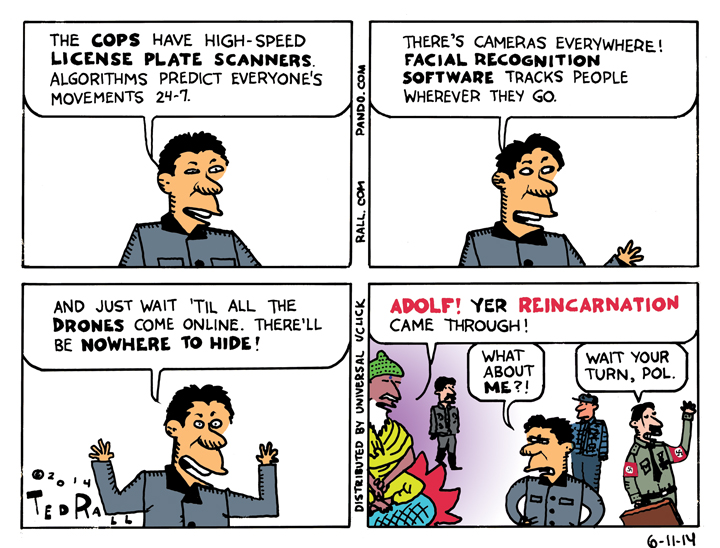After refusing to concede, shaking up the Pentagon, firing key staffers at NSA and Homeland security, it looks like Donald Trump is setting up a possible coup d’état. That couldn’t happen here? Why? Because it’s against American values?
It Could Easily Happen Here, Soon

You don’t want to lose your job. How would you feel if getting fired would mean that you would spend the rest of your life in prison? You would do anything to keep working.
Anything.
That’s the position in which Donald Trump finds himself.
The president is the target of a myriad of congressional, state and federal investigations into his business practices. Trump could resign in exchange for a deal with Mike Pence to pardon him as Ford did for Nixon, or hope for a victorious Joe Biden to do the same in the spirit of looking forward, not backward.
But a presidential pardon wouldn’t apply to the biggest threat to Trump’s freedom: the New York-based inquiries by the U.S. attorney for the Southern District of New York, New York’s attorney general and the Manhattan D.A.’s office into hush payments that former Trump lawyer Michael Cohen made to Playboy model Karen McDougal and the adult-film actor Stormy Daniels, violations of the Constitution’s emoluments clause and into Trump’s business practices in general.
It’s highly unlikely that, as long as he continues to reside at 1600 Pennsylvania Avenue, Trump will be frog-marched into a police van. Many legal experts argue that presidents enjoy at least temporary immunity from prosecution. Department of Justice memos dating to 1973 state that, as a matter of policy though not law, a sitting president should not be indicted.
If Joe Biden maintains his double-digit lead in the polls, however, Trump stands to lose his executive immunity from prosecution early next year. At age 74, even a five-year prison term could effectively become a life sentence. What would Trump be willing to do to avoid that?
In the back (not all the way back) of Trump’s mind has to be the possibility of canceling the election.
There has been speculation, from such notables as Hillary Clinton, that Trump might refuse to leave the White House if he loses to Biden. Indeed, Trump has fed rumors that he plans to discredit the results in case of a loss. He says mail-in balloting would be plagued by fraud and foreign interference and refuses to commit to accepting the results. If I were the president, I would reject this option. Refusing to leave would be far from certain to allow him to remain in office more than a few weeks or months.
Another crisis scenario making the rounds has Republican governors loyal to Trump refusing to certify the results in their states. Under one of the more arcane sections of the Constitution the final result would be determined by the House of Representatives under a one state delegation–one vote scheme. Most states are majority Republican so Trump would probably win. Trump shouldn’t go with this plan either. Relying on feckless governors in the House of Representatives process would leave too much to chance.
Only one approach comes close to guaranteeing that Trump remains at the helm for the foreseeable future and thus out of the clutches of New York prosecutors: canceling the election entirely.
On or about November 1st, he takes to the airwaves.
“My fellow Americans,” he intones, “we are a time of unprecedented crisis. We are deep in the dreaded second wave of the coronavirus. It would be reckless and irresponsible to ask people to go outside and stand in line, risking death, in order to cast a vote that can easily be cast next year, after we have a vaccine. Moreover, the streets of many of our cities have been overrun by rioters and looters. We can’t have an election without law and order. Therefore, we will delay the vote until our safety can be guaranteed. God bless America.”
Never mind that the riots will have been provoked by Trump’s own federal government goons, the so-called Federal Protective Service, or that the pandemic will be raging because of his own incompetence, denial and inaction. His argument will ring true with his Republican base and a few moderates. As usual, Democrats will be stunned, clueless and impotent.
Trump has set the stage for a too-dangerous-to-vote argument.
Black Lives Matters protests were winding down before he sent FPS to Portland and Seattle. Thanks to these violent agents provocateurs the crowds of angry protesters are growing, buildings are burning and people are getting killed. He wants to send thugs to Chicago and other cities as well. By October they could be all over the country, spreading chaos.
After downplaying the threat of COVID-19 for months, the president has radically reversed course. He is wearing a mask in public, urging others to do so and resuming coronavirus-themed press briefings, replacing public health officials as the face of the crisis response. The new messaging: COVID is deadly. Mail-in ballots, the social-distancing alternative to IRL voting, has been discredited by the GOP; anyway, it’s too late to implement it now. Just watch: he may call for schools to remain closed, another switch.
There is no legal mechanism for canceling a federal election. The Supreme Court can’t do it. There are no exceptions, not even for nuclear war. The U.S. system will have broken down.
What will happen next? We have seen it many times in many other countries. Trump and his associates will not be able to allow the media to talk, the courts to rule or the politicians to criticize his coup.
Trump, former president and now dictator, will censor and suppress dissent to protect his regime. Martial law will be declared. Media outlets, including social media online, will be seized and censored. Lists of potential critics and opponents—leading Democrats, academics, intellectuals, pundits, even political cartoonists—will be drawn up. Those on the list will be arrested, or worse.
They say it—fascism, authoritarianism—can’t happen here. But if you’re Donald Trump and you think you’re about to lose and go to prison, what other option do you have?
(Ted Rall (Twitter: @tedrall), the political cartoonist, columnist and graphic novelist, is the author of the biography “Political Suicide: The Fight for the Soul of the Democratic Party.” You can support Ted’s hard-hitting political cartoons and columns and see his work first by sponsoring his work on Patreon.)
Guest Post: Sometimes You Just Gotta Let It Out
I think this lady deserves a hearing here at the Rallblog. Because it’s where we’re at right now. She’s reacting to Obama’s “Syria” speech.
Susan
http://www.youtube.com/watch?v=XunOXRiOv0E
SYNDICATED COLUMN: Brave New Book
Political Scientist Argues the U.S. is a Police State
The United States is a police state.
Not in danger of becoming one.
Is.
And it’s too late to restore democracy.
That’s the stark message of Andrew Kolin’s brave, lucid and important book “State Power and Democracy: Before and During the Presidency of George W. Bush.”
Kolin comes out swinging like Joe Frazier. Illusions and delusions about America as a democracy, much less one that is benevolent, don’t stand a chance.
The U.S., Kolin says, shares all the major attributes of a Third World police state: a constant state of emergency in which security always trumps civil liberties; sidestepping of laws by the government; excessive secrecy; the use of preventative detention and holding enemies of the state without filing formal charges; the manufacturing of reasons to go to war.
“The expansion of state power over the course of U.S. history came at the expense of democracy,” Kolin begins. “As state power grew, there developed a disconnect between the theory and practice of democracy in the United States. Ever-greater state power meant it became more and more absolute. This resulted in a government that directed its energies and resources toward silencing those who dared question the state’s authority.”
Some will find Kolin’s more-in-sorrow-than-in-anger deadpan delivery disconcerting or depressing. I think it refreshingly honest. Notice his use of the past tense to describe this country?
The U.S. is over. It’s always been over.
Creeping authoritarianism, Kolin says, began “not long after the end of the Revolutionary War, starting with the conquest of North America and by the start of the twentieth century, continuing with the expansionism outside of North America.”
That’s halfway down the first page.
A hundred pages in, you’ll either be stuffing rags into Molotov cocktails or slitting your wrists. You’ll definitely check the expiration date on your passport.
I was surprised to learn that Kolin is a political science professor at Hilbert College in upstate New York. His methodical walk through U.S. history and the struggle between increased state repression and popular democratic movements, a tug-and-pull in which government and its big business allies won the important battles, feels like a tight legal brief.
As Kolin argues, the fix was in from the start.
“The framers [of the U.S. Constitution] needed to establish a government that could promote and protect property, regulate the economy, create an elaborate infrastructure, and acquire native Indian lands, adhering to the policy of North American expansion, while allowing the democratic surge from below to be both expressed and contained,” Kolin writes.
Obviously, the legal status of most Americans has improved since 1789. For example, “the Abolitionists prove that political movements can disrupt repressive state policies and advance democracy.” However: “The success of the Abolitionists suggests that the government can accommodate reformism, provided its core interests [namely, to enlarge state power] remain unaffected.”
Anyone who has read Zinn or Chomsky will be familiar with the long litany of criminality and ultraviolence which expose the claim of exceptionalism as a ridiculous hoax. These are all here: the Sedition Acts, the Palmer Raids, the Red Scare, dirty deals with dictators. Where the book becomes indispensable is its last third, focusing on the Clinton, Bush and early Obama administrations. This, the author argues beyond any sane ability to disagree, is when Americans citizens lost our basic freedoms and civil liberties once and for all. Habeas corpus, an 800-year-old right held by the citizens of all Western nations, gone without so much as a broken window. A president-king who orders the execution of American citizens without a trial—nay, without evidence of wrongdoing, with barely a harshly-worded newspaper editorial to complain.
For Kolin the USA-Patriot Act, passed in haste by a cowed and cowardly Congress that hadn’t had time to read it after 9/11, marks the final end of formal democracy in the United States. If nothing else, sneak into a bookstore (if you still have one in your town) and read pages 142 to 152.
Here you will find the most thorough and clear dissection of this horrible law in print. Describing Title I, for example, Kolin explains: “Due process is not mentioned in the part that grants the president the authority to freeze assets at the start of, or even prior to an investigation [into terrorism], instead of after it is completed. All property seized can be disposed of according to the president’s wishes. There is no legal requirement to have a court order prior to a seizure, creating the possibility that mistakes may be made and, in most cases, won’t be corrected.”
Unfair confiscation may seem like a minor concern for an innocent man or woman arrested, tortured or assassinated on the order of a president. For conservatives who believe property rights are sacrosanct, however, the symbolism is unmistakable: a government that can steal your stuff with impunity is the enemy of the people.
I can imagine one logical objection to Kolin’s thesis. The government may have the right to oppress. But it is not impelled to do so. So long as government officials are well-intentioned men and women, stout of heart and full of integrity, they will refrain from abusing the rights they claim against us.
However, recent history proves that our government is not run by such individuals. And even if it were—a purely theoretical supposition—who would want to live in a nation where the difference between democracy and dictatorship relies on the whims of a coterie of elites?
Though “a glimmer of hope seemed to appear after President Obama took office,” Kolin shows how the Democratic president “merely modified police state practices.” Furthermore, the transitional nature of the brutal authoritarian tactics enacted by Bush into the next presidency indicates that they are not anomalous but structural. “The Obama Administration’s position that amnesty should be granted to those who tortured [under Bush] as well as those who authored the torture memos, itself violates national and international law; it also ensures that such policies will likely be repeated.”
Attorney General Eric Holder said: “We don’t want to criminalize policy differences.” Kolin replies: “Since when is support for a police state a policy difference?”
If you’ve somehow managed to ignore Obama’s record over the last few years, and you’re still thinking of voting for him next November, this book will change your mind.
Ted Rall is the author of “The Anti-American Manifesto.” His website is tedrall.com.)
COPYRIGHT 2011 TED RALL
SYNDICATED COLUMN: WikiLeaks: The Devils We Know
Cables Reveal Background of Pro-Dictator U.S. Policy
After the Soviet collapse in 1991 U.S. policy toward Central Asia was transparently cynical: support the dictators, screw the people.
As the U.S. stood by and watched, corrupt autocrats looted the former Soviet republics of Turkmenistan, Uzbekistan, Kazakhstan and Tajikistan. Dissidents were jailed, massacred—even boiled.
Well, actually, the U.S. was anything but passive. They negotiated deals for oil and gas pipelines. They rented airbases after 9/11. They poured in tens of millions of American tax dollars—all of which wound up in secret bank accounts belonging to the dictators and their families. Meanwhile, average citizens lived in abject poverty.
During trips to Central Asia the locals constantly ask me: “Why doesn’t America stop supporting [insert name of corrupt dictator here] so we can kill him and free ourselves?”
Poor, naïve people. They believe our rhetoric. They think we like democracy. Actually, we’re all about the looting. Dictators are easier to deal with than parliaments. One handshake and a kickback, that’s all you need with a dictator.
Central Asia only had one democratically elected president, Askar Akayev of Kyrgyzstan. George W. Bush ordered the CIA to depose him in a coup.
Americans who care about human rights have long wondered: Is the State Department stupid and/or naïve? Or did the diplomats in Tashkent and other capitals of unspeakable misery understand the brutal and vile nature of Central Asia’s authoritarian leaders?
An examination of the WikiLeaks data dump answers that question: Yes.
Hell yes.
Like those from concerning more prominent countries, the WikiLeaks cables on the Central Asian republics can be funny. President Gurbanguly Berdimuhamedov, a U.S. “ally in the war on terror” who seized power in a palace coup following the death of Saparmurat “Turkmenbashi” Niyazov, is described as “the ‘decider’ for the state of Turkmenistan.” This is true. Turkmenistan is an absolute dictatorship in which millions starve while Berdimuhamedov’s inner circle feasts on the profits from the world’s largest reserves of natural gas.
A December 2009 cable describes America’s pet autocrat as “vain, suspicious, guarded, strict, very conservative, a practiced liar, ‘a good actor,’ and vindictive.”
According to an unnamed source, the outwardly conservative dictator has a Russian mistress named Marina, with whom he has a 14-year-old daughter. Though Berdy’s power may be limitless, his intellect is not. “Berdimuhamedov does not like people who are smarter than he is,” says the cable. “Since he’s not a very bright guy, our source offered, he is suspicious of a lot of people.”
No one’s perfect. Least of all America’s allies in Central Asia.
On the other side of the steppe in Kazakhstan, President Nursultan Nazarbayev presides over the world’s largest oil reserves with an iron fist. Among his greatest hits: the convenient “suicides” of his top two political opponents a few months before a presidential “election.” The two men apparently shot themselves in the back of the head, then bound their own hands behind their backs and dropped into a ditch outside Almaty.
Needless to say, Nazarbayev is another valuable U.S. ally in the war on terror.
But that doesn’t stop American gossip. Nazarbayev’s defense minister, says an embassy staffer in Astana, “appears to enjoy loosening up in the tried and true ‘homo sovieticus’ style—i.e., drinking oneself into a stupor.” But alcoholism isn’t illegal. Graft is—and the president is public enemy number one.
“In 2007, President Nazarbayev’s son-in-law, Timur Kulibayev, celebrated his 41st birthday in grand style,” explains an April 2008 cable. “At a small venue in Almaty, he hosted a private concert with some of Russia’s biggest pop stars. The headliner, however, was Elton John, to whom he reportedly paid one million pounds for this one-time appearance.” How did he come up with all that coin? “Timur Kulibayev is currently the favored presidential son-in-law, on the Forbes 500 list of billionaires (as is his wife separately), and the ultimate controller of 90% of the economy of Kazakhstan,” states a January 2010 missive.
Membership has its privileges. The U.S. has never spoken out against corruption or human rights abuses in Kazakhstan.
So it’s clear: American diplomats have no illusions about their brutal allies. Interestingly, Central Asia’s overlords have a dismally accurate view of corruption in the U.S. government.
“Listen, almost everyone at the top [of the Kazakh regime] is confused,” First Vice President Maksat Idenov told the U.S. ambassador to Kazakhstan early this year. “They’re confused by the corrupt excesses of capitalism. ‘If Goldman Sachs executives can make $50 million a year and then run America’s economy in Washington, what’s so different about what we do?’ they ask.”
No response was provided.
(Ted Rall is the author of “The Anti-American Manifesto.” His website is tedrall.com.)
COPYRIGHT 2010 TED RALL




